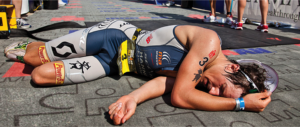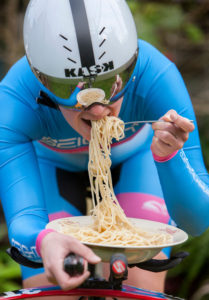
Triathletes are the Type ‘A’s of the sporting world. We embrace the challenge, revel in the pain and possess the drive to continually find that extra one per cent. Past glories are fleeting and we ‘know’ we can always do better.
The problem is, this behaviour and approach to training, racing and life, can come at a cost. I know, because by late 2015 I was broken.
Coming off the high of my first Olympic distance triathlon in Nov 2014 I was pumped! Training was addictive, I was getting stronger and PBs were falling like pins in a bowling alley. Nothing could stop me …… I was an athlete!!!
I signed up with a coach, locked in several more events and even entered my first half Ironman. I mean, how hard could it be? “I …… was an athlete!”
Fast forward 12 months, and I was a mess. Immune system depleted, man flu, demotivated, disillusioned and ready to give the sport away completely. To top it all off, I developed a Kidney Stone which was THE most painful experience in my life. I’m told it can be worse than childbirth, but you didn’t hear that from me.
So what happened?
This may sound like a contradiction, but in its simplest form, I had overtrained and underprepared.
“Overtrained and underprepared”
I know, sounds stupid right? So let me explain by telling you what I did wrong:
Mistake #1: I didn’t listen to my body
I suffer from AF (Arterial Fibrillation). When my body gets run down my internal electrical systems freak out and my heart starts pumping irregularly. This can last anywhere between 4 and 24 hours, during which time I struggle to walk up a flight of stairs.
Throughout 2015 I constantly pushed my body up to this physical “rev limiter”. As a result I also gained a PB for the amount of times my heart went into AF. NOT SMART!
Learnings:
No matter what your physical condition, or injury, you have to tailor your training to suit.
I now take more rest days and carefully monitor my body throughout the week. If I’m not feeling right, I’ll either adjust the intensity of my work load for an individual session, or potentially skip it altogether and allow myself extra recover time.
Mistake #2: I didn’t eat properly
I didn’t change my eating habits. I didn’t refuel effectively pre and post training sessions and I definitely didn’t restrict the alcohol intake.
Learnings:
Your body needs to be fuelled at the right times to aid performance (training and racing) and more importantly, recovery.
I now see a nutritionist to learn how to better look after my body’s dietary needs. I’ve learnt what to eat, when to eat and how much to eat at each meal. I’ve also learned that alcohol directly impacts your training and performance – who knew?
Mistake #3: The intensity of my training was too high
I thought the harder I trained, the stronger I’d become. As a consequence, everything was done at full clip. Training sessions were competitive (well in my mind at least) so I always had to go hard no matter how I felt and what I was doing.
Learnings:
It took me a long time to understand the philosophy that to race fast you needed to train slow. 80% of your training should be at zone 2. I now ignore what others are doing around me and focus on my plan, my body and my pace.
“To race fast, you need to train slow. 80% of your training should be in zone 2”
Mistake #4: I was obsessed with the numbers
I loved my Garmin, I loved Strava, I loved getting trophies and I loved seeing PB’s.
“If it wasn’t on Strava, it didn’t happen”
In the pursuit of “numbers” I lost site of other important things like technique, pacing, hydration and ultimately listening to my body.
Learnings:
You won’t always get a PB. And that’s ok. The numbers only form part of the overall training story. Used in isolation they can paint a distorted picture and may even be detrimental to your performance. How you’re feeling on the day, weather conditions, fatigue levels, how much you had to drink the night before etc, are all factors that need to be considered.
Mistake #5: I didn’t understand the importance of recovery
I thought that the more you did in a week the better you’d become as an athlete. I followed heaps of athletes on social media and they all seemed to be training 7 days a week. So should I.
Learnings:
That’s ridiculous! Everyone needs time to recover and that’s where a lot of the benefits kick in. Recovery assists muscle repair, reduces the risk of injury and helps manages fatigue.
My new coach actually factors in more recovery time which is something I need to better manage my heart condition. The irony is that I’m training less and seeing greater improvements.
“I’m training less, and seeing greater improvements”
Mistake #6: I didn’t train with my race day nutrition
 To illustrate how underprepared I was for racing a 70.3. My previous coach only told me about salt tablets two weeks prior to the event. I had no idea what they were never mind used them in training. I didn’t know how much to take, when to take them and what effect they may have on me. Turns out, the balance of electrolytes in your body (sodium / salt being the key one) can significantly influence the bodies ability to remain hydrated. Again, who knew?
To illustrate how underprepared I was for racing a 70.3. My previous coach only told me about salt tablets two weeks prior to the event. I had no idea what they were never mind used them in training. I didn’t know how much to take, when to take them and what effect they may have on me. Turns out, the balance of electrolytes in your body (sodium / salt being the key one) can significantly influence the bodies ability to remain hydrated. Again, who knew?
Consequently by the 3km mark on the run the wheels fell off, my stomach no longer wanted to stay on the inside and I was reduced to an 18km walk run.
Learnings:
Practise eating what you’re going to be racing with, weeks and weeks prior to the event. Experiment with different types of hydration and nutrition. What works for shorter distances may not work for longer events.
Mistake #7: My training plans were not tailored to me
My old coach (and you’re probably beginning to see why they’re no longer my coach) didn’t tailor their training packages to the individual. The same schedule was handed out to everyone in their squad without any consideration of ability, health concerns or stage in their preparation leading up to a race. This was despite marketing their services as a tailored approach. Consequently I developed an injury, placed additional stress on my heart and wasn’t prepared for the race.
Learnings:
If you’re paying for a training plan. Make sure it’s truly tailored to your individual training needs. Talk to your coach regularly and ensure they’ll be flexible and adjust and alter the program as required. Oh, and make sure their ego isn’t bigger than yours.
Making mistakes can be the best way to learn, but learning from other people’s (mine) can be an even better way. Unfortunately it took me the best part of a year to get back on track and embrace this great sport of ours once again. I now proudly reclaim my title of ‘mid pack age group champion’ and have lined up for my next 70.3 adventure.
If you’ve got some similar learnings you’d like to share please leave me a comment and tell me about them.
Keep smiling Tri Monkeys

i’m obliged for the post.Really looking forward to read more. can i share this ?
Thanks. Of course. Glad this helped.